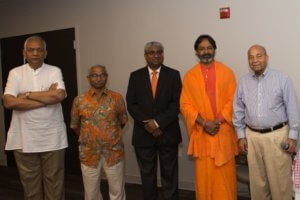Course Content
We have lost all major Sāṅkhya texts, so Sāṅkhyakārika is a good text to learn Sāṅkhya philosophy because it is very precise having only 70 verses. In this course the student will engage with the following components of learning.
- Study Sāṅkhya from the original text of Ishvarakrishna’s Sāṅkhyakārika.
- Refer to the commentaries of Gaudapadacharya, Vachaspatimishra and Vigñāna Bhikśu.
- Become familiar with the key terms of Sāṅkhya.
Why Sankhya
It is natural to ask why we should study Sāṅkhya philosophy. We find the answer in Sāṅkhyasūtra and Sāṅkhyakārika at the very beginning. We need to study Sāṅkhya because it is an antidote to three types of miseries that all living beings suffer from. These miseries are psycho-physical miseries, external miseries, and supernatural miseries. Although we have science to deal with these miseries, the solutions provided by science are neither total nor permanent.
दु:खत्रयाभिघाताज्जिज्ञासा तदपघातके हेतौ।
दृष्टे साऽपार्था चेन्नैकान्तात्यन्ततोऽभावात्।।१।
- duḥkhatrayābhighātājjijñāsā tadapaghātake hetau.
- dṛṣṭe sāpārthā cennaikāntātyantato’bhāvāt.
The effort (to learn Sāṅkhya philosophy in order) to find the reason for the three types of miseries that keep attacking us is not worthwhile because there are available means to deal with them. (If someone says so then the reply is) No, there is a need because the solution given by available means is neither total nor permanent.
How can Sāṅkhya succeed where science and other available means do not. The answer is that our miseries are created out of wrong knowledge of ourselves. For the miseries that are physical, science can help, but what about miseries that are created out of wrong understanding? We notice that people who have neither any physical nor material problems are also unhappy. The question is why? The answer is that because of a wrong understanding of our true selves, we identify ourselves with the body.
By taking ourselves to be the body, we become insecure because when the body is well, we think we are well, when it is not well, we think we are not well. And we know that the body is going to die, so we are always afraid that we are going to die with it. The biggest fear is the fear of death. Until the fear of death is overcome, we can never be totally happy. No science or technology can ever make us overcome the fear of death. Science can give us comfort not happiness. We normally do not make a distinction between comfort and happiness, and discomfort and unhappiness.
Total happiness comes only by knowing the true nature of ourselves, and our true nature is that we are absolute, blissful, and untouched by disease and death. It is important to know our true self because according to Sāṅkhya:
ज्ञानादृते न मुक्ति: – श्रुति
- Mokṣa is not possible without self-knowledge.
- Before knowing ‘The Self’, it is important to know what is not ‘The Self’.
So, Sāṅkhya talks about two major entities: Puruṣa and Prakriti. The former is the absolute entity, and the latter has 23 evolutes. Thus, the Sāṅkhya system has 25 fundamental tattvas or elements. Puruṣa is something like Brahma of Vedānta, Shiva of Tantra, and Prakriti is like the Māya of Vedānta, and Śakti of Tantra.
Although we talk about six Darśanas as different from each other, this is not the case. There is a great deal of overlap among them, so they are in fact complementary. And Sāṅkhya is important because by understanding Sāṅkhya, it becomes easy to understand Yoga philosophy, Vedānta philosophy, Upanishads, The Bhagavadgītā etc.














